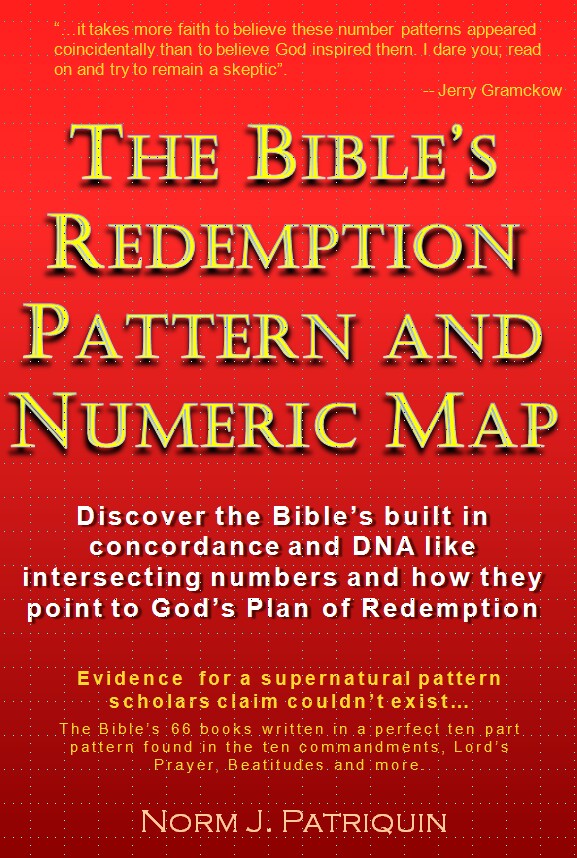Foreword from The Bible's Numeric Map and Redemption Pattern...
I’m not a math guy. I barely passed first-year algebra in ninth grade
and—many thanks to the California hippie influence in the 70s—that was
the last math class I was required to take. As I remember, I had no problem
passing my high school classes, despite almost never having any homework.
But that’s another story.
Anyway, while I don’t like math, I’ve always found numbers fascinating.
If those statements seem contradictory to you, well, they did to me,
too. Until I met Norm. In Norm I found a kindred spirit; someone who
finds numbers fascinating. But math? Not so much. The other bond I found
with Norm is a deep and respectful love of and curiosity about the Bible.
Norm, a computer programmer, has a gift that allows him to see numerical
patterns in the Bible, patterns I’ve skimmed right past repeatedly. Norm
has, I’ve now come to believe, made some revolutionary discoveries in
the Bible.
If you’re now thinking, “Good grief, more Bible-code speculations,” well,
I have two responses: First, some of the most respected and brilliant
men in history have suspected that the Bible is full of number “codes.”
Blaise Pascal said, “The Old Testament is a cipher.” By that he meant
it has numerical encryptions that, with the proper insight, can be
deciphered. Sir Isaac Newton spent more time working on deciphering
Bible “codes” than on his noted scientific discoveries. And Dr. Ivan
Panin devoted most of his life to painstaking exploration of the numerical
structure of the Scriptures.
My second response, after defending the legitimacy of Bible code study,
is that Norm’s discoveries are not really Bible codes anyway. The patterns
Norm has found will not unlock deep, hidden secrets; messages no one
has ever seen before in the Bible. They don’t predict future events,
but they might shed more insight on passages that refer to future events.
Norm’s number discoveries would be meaningless apart from the text in
which they appear. What Norm has found are fascinating and insightful
patterns.
What’s the difference between Bible codes and Bible patterns? The equidistant
letter sequence theory (an example of a Bible code) finds obscure messages
embedded (hidden) within the Scripture text. For example (in very basic
terms), we can find the letters for the word faith spaced equally
in the words of this phrase: After Paul picked other theories.
This fictional example is very basic, but the theory is similar to some
military codes.
In 1994, Professor Elyahu Rips, from the Hebrew University, along with
Doron Witztum and Yoav Rosenberg, used statistical methods and computers
to research the book of Genesis. Using equidistant letter sequence methods,
their computers found the names of dozens of Jewish sages who lived between
the ninth and eighteenth centuries. According to their study, which was
published in the scholarly journal Statistical Science (9:429-438),
the probability of such findings is 62,500 to 1 (that’s a .0016 percent
probability). Those figures appear to give some credence to the equidistant
letter sequence theory—and perhaps they pique your interest.
On the other hand, Norm’s number patterns (okay, really they’re God’s
number patterns that Norm has discovered) are themes related to numbers.
For example, what’s the best known verse in the Bible? (Hint: You’ve
probably seen someone at a sports event holding up a shirt or a placard
with this verse painted on it.) If you guessed John 3:16 (“For God so
loved the world, that He gave His only begotten Son, that whoever believes
in Him shall not perish, but have eternal life”), you are correct. This
just happens to be the 1,000th chapter of the Bible, and one-thousand
is said to be one of God’s numbers of perfection. Could the keystone
verse of the Bible in the chapter with Jesus teaching on the plan of
redemption just happen to be located in the perfectly numbered chapter?
Could it all just be coincidence? That was my assumption when Norm and I first talked, and when he first asked me to work with him on this project. But as I saw more and more of these amazing “coincidences” I finally concluded it takes more faith to believe these number patterns appeared coincidentally than to believe God inspired them. I dare you; read on and try to remain a skeptic.
Jerry Gramckow (editor and contributing writer)
Back to Home Page View Front Cover View Back Cover Read Summary
-top-

